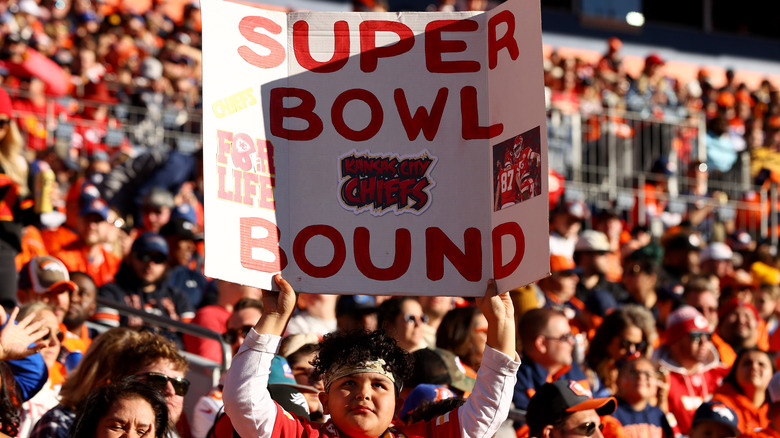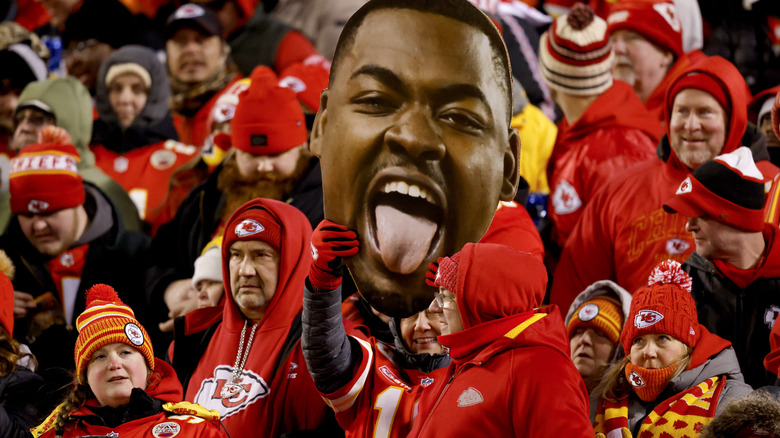Can The General Public Even Purchase Super Bowl Tickets?
Hundreds of millions of viewers worldwide watch the Super Bowl on TV each year, per the NFL. Add to that tens of thousands of lucky fans who see the big game in person. The site of Super Bowl LVII, State Farm Stadium, in Glendale, Arizona, has a total expanded capacity of up to 73,000 spectators. Super Bowl tickets can range in price from a few thousand dollars to tens of thousands of dollars on the secondary ticket market, based on Sporting News reporting.
Exactly how many people who we see on TV in the stadium each year are VIPs or friends and family of the team, and how many tickets are held by the average, everyday NFL fan? How are Super Bowl tickets even distributed? Is it possible for a typical team fan to simply buy one? According to CBS Sports, it's not easy to do so without some "in” with an NFL franchise or without shelling out exorbitant amounts of money. And as CBS Sports goes on to note, the limited availability of a Super Bowl ticket is entirely by design.
In 2022, the Super Bowl teams received roughly most of the tickets available
Via Yahoo! Sports, the most recent numbers for Super Bowl tickets' face value ranged in price from between $950 to $5,000 at Super Bowl LII, and prices only went up from there. Since then, the average face values of a Super Bowl ticket have not been disclosed by the NFL, according to CBS Sports. Per TickPick, tickets for the 2022 Super Bowl ranged in price from around $3,500 to $7,000. What is known for certain is each team in the game splits 35% of all tickets available which are most often distributed to friends, family, VIPs, and team employees.
Remaining Super Bowl tickets are then sometimes sold to season ticket holders through a lottery system. What's more, each player on each team gets two free tickets of their own, with the option to buy 13 more at face value — whatever that face value may be. Do the math, with 53 players on each team, and up to 15 tickets potentially taken by each, and an additional 35% of all tickets already given out to each team combined for all other purposes, including some given out to corporate sponsors, there simply aren't that many Super Bowl tickets left.
The hosting team also gets first dibs
As mentioned, Super Bowl LVII will occur at State Farm Stadium, where the Arizona Cardinals play. Accordingly, the Cardinals organization gets 5% of all remaining tickets to do with as they please. All other NFL teams then take their share, or 1.2% of the remaining tickets, according to CBS Sports. The league then gets the rest, which are sometimes sold at face value through a lottery (via TickPick). A few thousand Super Bowl tickets are reserved for NFL On Location, which are then packaged into an all-inclusive Super Bowl experience sold through Ticketmaster, as reported by Rolling Stone.
So where does that leave the average fan? Super Bowl tickets are never put on sale to the general public, and if you're not lucky enough to get one through a lottery system or to have some VIP connection to the team, getting your hands on one, not to mention two, can be an expensive challenge. Some Super Bowl tickets inevitably end up on the secondary market, sold at inflated prices that tend to decline closer to when the game happens. The NFL does lottery some Super Bowl tickets to NFL fans with certain health conditions and impairments through the Super Bowl ADA Random Drawing (via AS.com).


